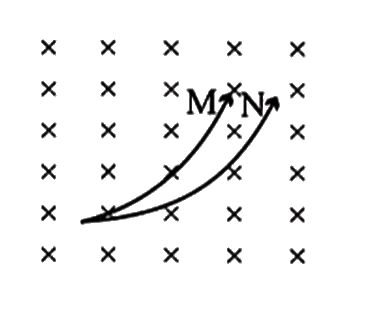(A): Two particles of same charge projected with different velocity normal to electric field experience same force
(R ): A charged particle experiences force, independent of velocity in electric field
Both .A. and .R. are true and .R. is the correct explanation of .A.
Both .A. and .R. are tru and .R. is not the correct explanation of .A.
A. is true and .R. is false
A. is false and .R. is true
The correct Answer is:A
To solve the question, we need to analyze both the assertion (A) and the reason (R) provided.
1. Understanding the Assertion (A):
- The assertion states that "Two particles of the same charge projected with different velocities normal to the electric field experience the same force."
- In an electric field (E), the force (F) experienced by a charged particle (q) is given by the formula:
F=qE
- This formula indicates that the force depends only on the charge of the particle and the strength of the electric field, not on the velocity of the particle.
2. Understanding the Reason (R):
- The reason states that "A charged particle experiences force, independent of velocity in an electric field."
- This is consistent with the formula for electric force mentioned earlier. The force experienced by a charge in an electric field does not change with its velocity.
3. Conclusion:
- Since both the assertion and the reason are true, and the reason correctly explains why the assertion holds (because the force is independent of velocity), we conclude that both the assertion (A) and the reason (R) are true, and R is the correct explanation of A.
Final Answer:
Both assertion (A) and reason (R) are true, and R is the correct explanation of A.
---
- The assertion states that "Two particles of the same charge projected with different velocities normal to the electric field experience the same force."
- In an electric field (E), the force (F) experienced by a charged particle (q) is given by the formula:
F=qE
- This formula indicates that the force depends only on the charge of the particle and the strength of the electric field, not on the velocity of the particle.
- The reason states that "A charged particle experiences force, independent of velocity in an electric field."
- This is consistent with the formula for electric force mentioned earlier. The force experienced by a charge in an electric field does not change with its velocity.
- Since both the assertion and the reason are true, and the reason correctly explains why the assertion holds (because the force is independent of velocity), we conclude that both the assertion (A) and the reason (R) are true, and R is the correct explanation of A.
Both assertion (A) and reason (R) are true, and R is the correct explanation of A.
Topper's Solved these Questions
- ELECTRIC CHARGES AND FIELDSBOOK - AAKASH SERIESCHAPTER - ELECTRIC CHARGES AND FIELDSEXERCISE - Exercise-II
56 Videos
- ELECTRIC CHARGES AND FIELDSBOOK - AAKASH SERIESCHAPTER - ELECTRIC CHARGES AND FIELDSEXERCISE - Practice Exercise
57 Videos
- ELECTRIC CHARGES AND FIELDSBOOK - AAKASH SERIESCHAPTER - ELECTRIC CHARGES AND FIELDSEXERCISE - Assess Your Self
13 Videos
- DUAL NATURE OF RADIATION AND MATTERBOOK - AAKASH SERIESCHAPTER - DUAL NATURE OF RADIATION AND MATTEREXERCISE - PRACTICE EXERCISEX
42 Videos
- ELECTRIC FIELD AND POTENTIALBOOK - AAKASH SERIESCHAPTER - ELECTRIC FIELD AND POTENTIALEXERCISE - PROBLEMS (LEVEL-II)
26 Videos
Similar Questions
The path of a charged particle projected into a uniform transverse electric field is
View SolutionTwo charged particle M and N are projected with same velocity in a uniform magnetic field. Then M and N respectively.

View SolutionIf a charged particle at rest experiences no electromagnetic force, then electric field in that region
View SolutionA charged particle moving in a magnetic field experiences a resultant force
View SolutionA proton and an alpha particle projected with same velocity in uniform transverse magnetic field then
View SolutionIf a charged particle at rest experiences no electromagnetic force, then
The electric field must be zero
View SolutionIf a charged particle kept at rest experiences an electromagnetic force,
View SolutionWhen does a moving charged particle not experience any force while moving through a uniform magnetic field ?
View SolutionIf a charged particle goes unaccelerated in a region containing electric and magnetic fields,
View SolutionIf a charged particle goes unaccelerated in a region containing electric and magnetic fields,
View Solution
